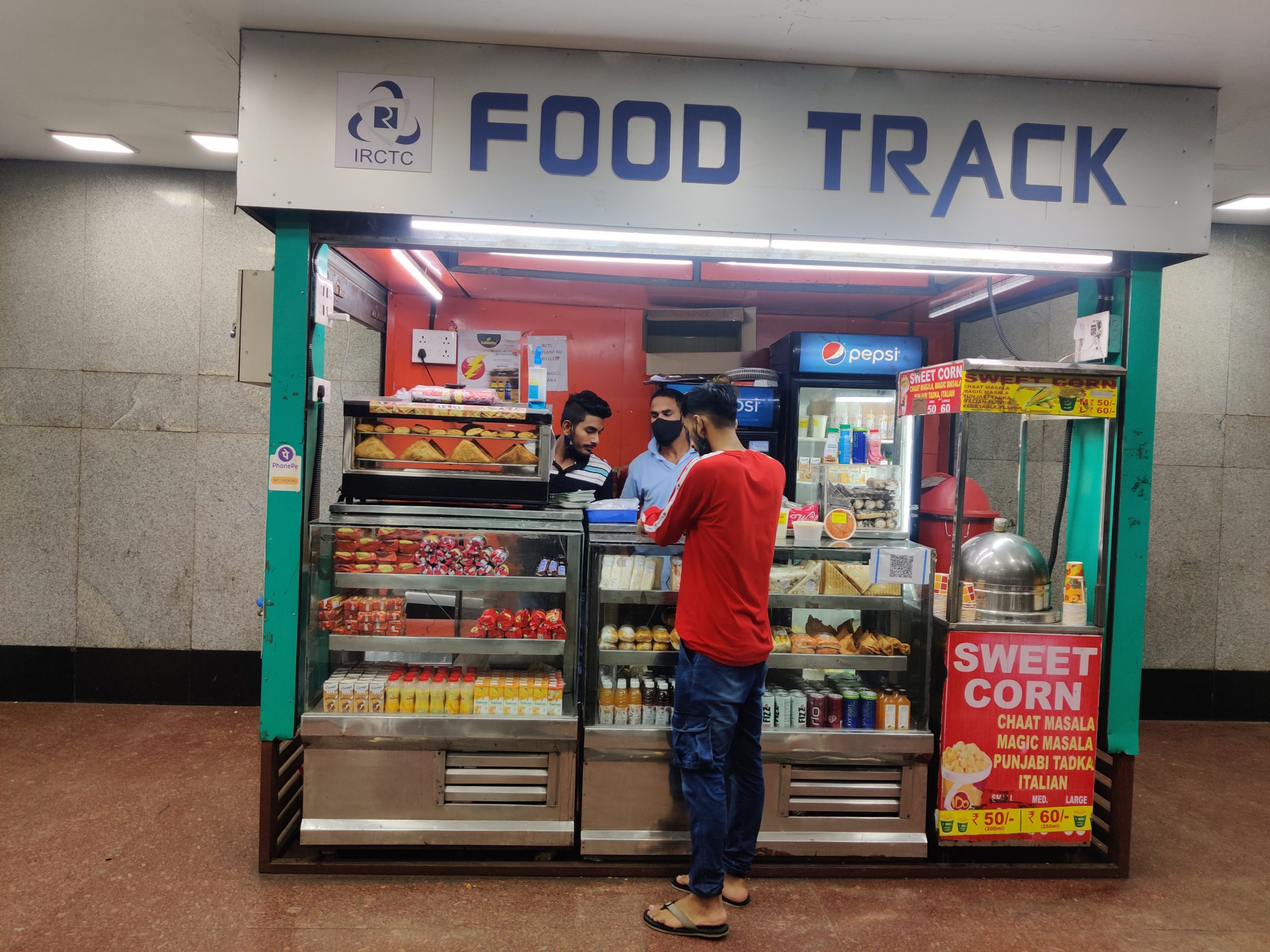
While the Delhi Metro Rail Corporation (DMRC) faces huge losses, what about the kiosks offering food and beverages at the stations? Some have closed down, and others continue on, earning sometimes less than half of what they made in pre-Covid times.
Manish Kumar, whose brother has six kiosks through tender with the DMRC at various stations in the yellow line of Delhi metro, is worried about the third wave. “If it happens, then we’ll just close everything and go back to our village in UP’s Moradabad. I’ll get back to farming. We can’t continue on like this.”
We meet Kumar at Hauz Khas metro station where he helps run one of the six kiosks under the name Food Track. He claims his brother Sintu faced heavy losses when he paid about 30 lakhs for 16-17 kiosks at the metro stations before Covid. “After lockdown we were forced to give up the lease. Now we have just a few left and they make barely enough money. Right now, it’s 2pm and I have made just about Rs 1,000 while earlier I would have made double that or even more.”
Since last year, when Covid-19 pandemic entered, it has been a tough ride for the overground and underground services — much like the other industries. In 2020, metro trains faced a complete shutdown from March 22 with services resuming after more than five months on September 7. This year, on April 6, owing to the imposition of night curfews, Delhi metro’s restrictions began and went into full suspension mode on May 10 – as by May 2, Delhi was witnessing 20,394 positive cases a day and 407 deaths according to the Delhi State Health Bulletin.
Now, metro services are crawling back to its old days, reopening on June 7 but with a 50% seating capacity. Rajiv Chowk, which at any given point was a crowded junction, looks unnervingly empty in the early evening hours, as long queues outside the station stop the overcrowding of the station where the blue line and yellow line meet.
In a statement on June 24, Anuj Dayal, Executive Director, Corporate Communications at DMRC said “the carrying capacity of the Delhi Metro as per existing guidelines is in the range of 10-15% only.”
With months of closure and low footfall, even franchise chains such as Café Coffee Day seem to have packed up and left their outlet in Rajiv Chowk metro station. Another kiosk which remains closed is Munch, but a shop hand here said they will soon reopen, “the boys working here were not returning mostly out of fear of Covid. Now that they have come, we are cleaning up and will open.”
The man who didn’t wish to be named shared that they were getting 50% of their monthly earnings, justifying it for his employers. He said, “if the shop is closed and there are no sales, how can they possibly pay us? We are all in the same situation”.
At the same time, for Kumar, paying his employees was out of the question. “We had nothing left. We had to pay our house rent in Delhi. The boys working with us all came from the same village, they went back home. When we reopened is when we have started paying them again, which is Rs 500 per day.”
Many migrants come to Delhi hoping to get a better opportunity than in their hometown, but for many Covid made them reclaim the only job available in their village – farming. “Business tha apna, ab sab khatam ho gaya (we had a business, now it’s all over),” Kumar says who came first to Delhi in 2011, “since then we have had fast food stalls. Earlier we use to have the entirety of yellow line and a few stations in pink line, but now things have really changed for us.”
A report by Hindustan Times Revenue records show that in the 2020-2021 fiscal, DMRC’s revenue from traffic operations, which includes income from tickets, feeder bus services and rentals, and other services, fell sharply to ₹895.88 crore, from ₹3,897.29 crore in 2019-2020. Similarly, in 2018-19, their income from operational and non-operational sources was ₹3,582.80 crore.
The Metro body’s books also show that in 2020-21, the agency ran into deficits of ₹1,784.87 crore, as against a surplus of ₹758.01 crore in 2019-20. In 2018-19, DMRC recorded a surplus of ₹1,027 crore.
At the same time, a year prior, earnings were at a high. The annual report of 2019-2020 shows Under the business head ‘Traffic Operations’ the Delhi Metro earned Rs 3897.29 crore during the year, against which expenditure incurred was Rs 3139.28 crore yielding an operating profit of Rs 758.01 crore. As compared with the previous year, there is an increase in the revenue from Traffic Operations by an amount of Rs 314.49 crore i.e., an increase of 8.78%.
(Cover: Credit – Sashikala VP)
Delhi hosted what organisers describe as the world’s first player auction in golf, launching ‘72…
An elderly woman recalls how her six-year-old granddaughter lay bleeding after a speeding car hit…
Municipal Corporation of Delhi plans a unified policy enabling RWAs to adopt and maintain parks…
A 17-year-old boy allegedly died by suicide after jumping before a moving train at Uttam…
Delhi High Court grants bail to 26-year-old Thar driver accused of mowing down two in…
Two Rohini men arrested for fatally stabbing one person and injuring another during a robbery…